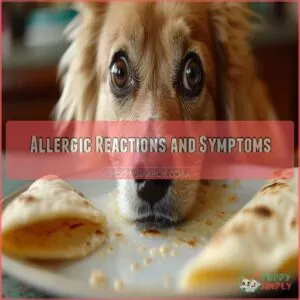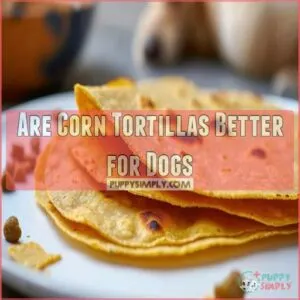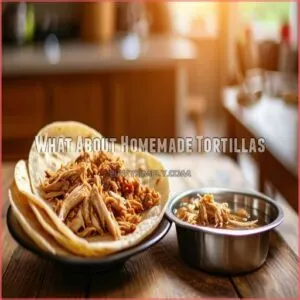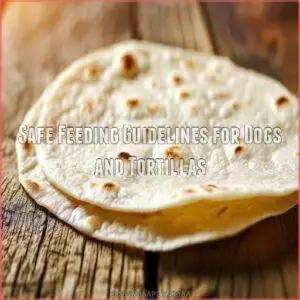This site is supported by our readers. We may earn a commission, at no cost to you, if you purchase through links.
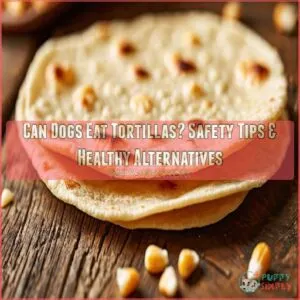
Plain corn tortillas are generally better than flour ones because they’re easier to digest. Think of it like this: corn tortillas are the "whole wheat bread" of the tortilla world.
However, don’t let your pup gobble them down; too many can cause weight gain. Also, watch out for salt and added seasonings – they’re not your dog’s best friend! A tiny piece as a very occasional treat is fine, but moderation is key.
Want to know more about safe and healthy alternatives? Read on to discover surprising options your furry friend will love.
Table Of Contents
- Key Takeaways
- Dangers of Feeding Tortillas to Dogs
- Can Dogs Eat Tortillas Safely
- Risks Associated With Tortillas for Dogs
- Healthy Alternatives to Tortillas for Dogs
- What to Do if Your Dog Eats a Lot of Tortillas
- Safe Feeding Guidelines for Dogs and Tortillas
- Frequently Asked Questions (FAQs)
- Can dogs eat tortilla shells?
- Can eating tortilla help with weight loss?
- Can dogs eat tortilla chips?
- Can dogs eat fried tortillas?
- Can dogs eat flour tortillas?
- Are tortillas bad for dogs?
- Are corn or flour tortillas better for dogs?
- Can animals eat corn tortillas?
- Can I give my dog tostitos?
- Is it okay for dogs to eat flour?
- How can I train my dog to avoid tortillas?
- Are there dog-friendly recipes using tortillas?
- Can I feed tortilla chips to my dog?
- How do tortillas affect dog allergies?
- Are tortilla wraps suitable for dogs with diabetes?
- Conclusion
Key Takeaways
- Keep tortillas as an occasional treat for your dog, ensuring they’re plain and free of harmful toppings like onions or garlic.
- Watch portion sizes to prevent weight gain and avoid excessive salt, which can lead to dehydration in dogs.
- If your dog shows signs of allergies or intolerance, such as itching or digestive issues, consult your vet immediately.
- Avoid giving your dog human foods like hot dogs with toxic additives, consider healthier alternatives like fruits, vegetables, and dog-friendly snacks to satisfy your dog’s treat cravings safely.
Dangers of Feeding Tortillas to Dogs
Feeding tortillas to your dog might seem harmless, but they’re packed with calories and salt that can lead to weight gain and dehydration.
Additionally, certain tortilla fillings and seasonings may trigger allergies or intolerances, causing discomfort for your furry friend.
Calorie Content and Weight Gain
Understanding the calorie content of tortillas is essential to preventing dog weight gain.
Dogs can quickly pack on pounds with these high-calorie treats.
Here’s why:
- Tortilla calories are deceptively high for their size, easily tipping the scales.
- Dog obesity risks increase with regular feeding.
- Overfeeding tortillas can interfere with maintaining a healthy dog weight.
Salt Content and Dehydration Risk
Too much salt can leave your dog parched, like being stranded in a desert without water.
Tortillas often pack a salty punch, which mightn’t seem like a big deal, but it adds up and can lead to dehydration.
Keep an eye out for dehydration symptoms like excessive thirst or dry gums, and make sure your pup’s water bowl is always full.
Tortilla Fillings and Seasonings
Tortilla toppings can turn a snack into a health hazard for dogs. Key things to watch out for include the fact that some popular taco fillings, like those containing onions and garlic dangers, are particularly toxic.
- Dog-safe fillings: Avoid known dangers like onions and garlic.
- Nutritional value of seasonings: Keep spices minimal; too much salt is harmful.
- Common tortilla ingredients: Steer clear of fatty meats or excessive cheese, which can lead to digestive upset.
Allergies and Intolerance
You’re eyeing those tortilla fillings, but there’s another factor to think about: allergies and intolerance. Dogs can have gluten sensitivity or other food allergies, reacting to common tortilla ingredients.
| Symptom | Possible Cause | Action Plan |
|---|---|---|
| Scratchiness | Food allergies | Consult a vet |
| Tummy troubles | Gluten sensitivity | Switch diet |
| Lethargy | Food intolerance | Monitor closely |
| Ear infections | Common allergens | Seek medical advice |
Keep an eye out for food intolerance symptoms.
Can Dogs Eat Tortillas Safely
Let’s get this straight: can your furry friend safely munch on a tortilla? The short answer is a cautious "maybe." While tortillas aren’t toxic, they’re not exactly nutritional powerhouses for dogs. Think of them as the occasional treat, not a staple in their diet.
Plain corn or flour tortillas, given in tiny portions, are generally okay. But, remember, moderation is key! Too many calories can lead to weight issues, and even plain tortillas contain some salt.
If you’re looking for dog-safe tortilla options, check out products specifically designed for canine consumption, such as those found in dog safe tortillas stores like online tortilla shops. Homemade tortillas might seem healthier, but they still pack a caloric punch.
The ingredients matter, too. Avoid those loaded with onions or garlic – they’re toxic to dogs. Looking for safer options? Plenty of delicious, dog-friendly alternatives exist. Check out commercial dog treats or explore homemade options using sweet potatoes. They’re a tasty and nutritious swap!
Always be aware of the foods that can harm your dog, such as hot dogs and their health risks. Always prioritize your dog’s health and consult your vet if you have any concerns about your dog’s diet.
Risks Associated With Tortillas for Dogs
Feeding your dog tortillas might seem harmless, but there are several risks you should consider.
From potential allergic reactions to the high salt content, tortillas can pose unexpected health challenges for your furry friend.
Allergic Reactions and Symptoms
Imagine your dog sneaking a piece of your tortilla and suddenly you notice digestive upset.
Gluten intolerance is a sneaky culprit, showing up as vomiting or diarrhea.
If your dog has skin issues or weight loss, it might be linked to allergies.
Always monitor for these symptoms to prevent trouble and keep your furry friend wagging instead of worrying.
Salt Content and Seasoning Risks
Salt intake is another concern when feeding tortillas to your furry friend.
These snacks often come loaded with sodium, which can be tough on a dog’s kidneys and lead to dehydration.
Plus, some tortilla toppings and seasonings can spell trouble, introducing ingredient risks like garlic, which isn’t dog-friendly.
It’s best to opt for safe seasonings if you must indulge!
Are Corn Tortillas Better for Dogs
Corn tortillas, often pegged as slightly better, are gluten-free, which helps if your dog’s sensitive to gluten.
If you’re looking to incorporate tortillas into their diet, consider checking out online stores that sell tortillas for dogs, like tortillas for dogs.
But don’t be fooled; they’re still packed with calories and sodium.
So, while they’re a tempting treat, moderation is key. Imagine them as a rare indulgence rather than a staple in your dog’s diet, balancing fun with safety.
What About Homemade Tortillas
Switching to homemade tortillas might seem better for your dog’s health, but they’re still not without risks. Watch out for:
- Ingredients like flour and salt that aren’t dog-friendly
- Low nutritional value, leading to potential health issues
- Recipe ideas that may not suit furry friends
- Hidden allergens impacting sensitive pups
- Weight gain due to high calorie content
Choose wisely!
Healthy Alternatives to Tortillas for Dogs
So, your doggo’s eyeing your tortilla? Let’s explore yummy, healthier alternatives that’ll keep their tail wagging without risking upset tummies.
Dog-Friendly Fruits and Vegetables
Fido’s fruit fiesta can be a riot of colors and flavors! Apples, blueberries, and carrots aren’t just tasty; they’re low-calorie and nutrient-rich, too.
| Fruit or Veggie | Health Benefits | Prep Tips |
|---|---|---|
| Apples | Fiber & Vitamin C | Chop and core, no seeds |
| Blueberries | Antioxidants galore | Serve fresh or frozen |
| Carrots | Crunchy & Vitamin A | Slice into sticks |
| Bananas | Energy boost | Mash or slice |
| Cucumber | Hydration & low cal. | Peel, slice, or cube |
Commercial Dog Treats and Snacks
When it comes to satisfying your dog’s snack cravings, commercial dog treats are a safe bet. They often contain balanced nutrition and adhere to treat safety guidelines. Here’s what to keep in mind:
- Dog treat ingredients: Opt for natural ingredients.
- Commercial treat brands: Choose reputable brands.
- Healthy snack alternatives: Opt for low-sodium, low-fat options to avoid pancreatitis and other issues associated with processed meats like bacon. Avoid high-calorie items.
- DIY dog treats: Try making your own.
- Treat safety guidelines: Always follow portions.
Cooked Sweet Potatoes as a Healthy Option
Sweet potatoes are a dog’s delightful, healthy alternative to tortillas.
Rich in vitamins like A, C, and B6, sweet potatoes boost nutrition and flavor.
| Nutrient | Benefit |
|---|---|
| Vitamin A | Eye health, immune boost |
| Vitamin C | Antioxidant, tissue repair |
| Fiber | Digestive health |
| Potassium | Heart function |
With simple prep, these tubers make tasty dog treats, keeping tails wagging!
Gluten-Free Alternatives
Gluten-free alternatives like rice wraps or quinoa tortillas can make safe and tasty treats for your dog.
Some pet owners also consider full circle feeding options that involve rotating between grain-inclusive and grain-free diets, such as those that include legumes for puppy nutrition.
If you’re in a creative mood, try sweet potato wraps or veggie wraps. These options are easy on the tummy and keep tail wagging without the worry of gluten. Just remember, moderation’s key, so keep the serving sizes dog-friendly!
What to Do if Your Dog Eats a Lot of Tortillas
If your dog has gobbled up a bunch of tortillas, it’s important to reach out to your veterinarian for guidance.
Keep a close eye on your pet for any unusual symptoms or behavior changes.
Contacting a Veterinarian for Advice
If your pup has gone on a tortilla binge, don’t panic—reach out to a veterinarian for advice.
They can offer reassurance or help you decide if emergency care’s needed.
1. Be honest about tortilla type and amount.
2. Mention any tortilla-related symptoms.
3. Follow their instructions.
4. Remember, better safe than sorry!
Monitoring Your Dog for Adverse Reactions
After calling your vet, keep a close eye on your pup.
Watch for any unusual changes.
Is your dog showing signs of diarrhea or vomiting?
Notice any skin changes or unexpected weight loss?
Keep an eye out for behavioral shifts, too.
Even subtle changes are worth noting.
This careful monitoring helps you and your vet assess the situation, ensuring your furry friend gets the best care.
Signs of Concern and When to Seek Help
While keeping an eye on your pup, watch out for signs like vomiting, diarrhea, or lethargy.
If your pup has a tortilla allergy, you might see these symptoms.
If Fido seems off, shows appetite loss or skin issues, it might be tortilla trouble.
Don’t hit the panic button just yet, but if these symptoms stick around, dialing up your vet is a wise move.
After all, better safe than sorry, right?
Safe Feeding Guidelines for Dogs and Tortillas
Sharing tortillas with your dog requires moderation and careful selection.
Introduce these snacks gradually to make sure your dog is safe and enjoys them.
Stick to small portions, avoid toppings.
Portion Control and Moderation
Imagine this: you’re balancing a tightrope with your dog’s treats.
Portion control‘s your safety net, preventing any wobbles in your pup’s weight.
Keep tortillas as infrequent treats, not meals, to sidestep calorie overload.
A dog’s daily calorie cup runneth over quickly, so think small piece, big love.
Counting calories isn’t just for you; it’s extremely important for Fluffy too.
Avoiding Toppings and Seasonings
When feeding your dog tortillas, skip the toppings and seasonings.
Those tasty extras, like onion and garlic, are dangerous seasonings for dogs.
You’re better off sticking to dog-safe toppings and healthy alternatives that won’t upset their stomach.
Remember, the salt content in some seasonings can lead to dehydration.
Keep it simple and make sure your pup stays happy and healthy.
Introducing Tortillas Gradually
Start small when introducing tortillas to your pup.
Watching closely helps you gauge your dog’s reaction and build tolerance over time.
Monitor their digestion to make sure they’re not experiencing any issues, keeping in mind that tortillas can be a choking hazard for dogs.
Here are quick tips:
- Start with tiny pieces
- Feed as an occasional treat
- Observe for any allergies
- Make sure no harmful ingredients are present
Frequently Asked Questions (FAQs)
Can dogs eat tortilla shells?
Sure, dogs can eat tortilla shells in moderation.
They won’t harm your pup but aren’t nutritious.
High in calories and salt, they should be an occasional treat, avoiding ingredients like onions or garlic that could be harmful.
Can eating tortilla help with weight loss?
Eating tortillas probably won’t help with weight loss; they’re high in calories and low in nutritional value.
You’re better off choosing whole foods like fruits, vegetables, and lean proteins that provide nutrients and support a healthy diet.
Can dogs eat tortilla chips?
Dogs shouldn’t munch on tortilla chips.
They’re salty and fatty, which can lead to health issues like dehydration and obesity.
Instead, treat your pup with dog-safe snacks to keep their tail wagging without the worry.
Can dogs eat fried tortillas?
Fried tortillas aren’t ideal for dogs.
They’re high in calories and unhealthy fats, which can lead to weight gain and tummy troubles.
Prioritize low-sodium snacks like whole grain crackers, and be aware that even common human snacks like saltine crackers can be detrimental to your dog’s health. Stick to dog-friendly snacks and consult a vet if you’re unsure about safe treats.
Can dogs eat flour tortillas?
Flour tortillas might seem harmless, but they’re high in calories and sodium.
Treats specifically designed for pets can keep them healthy.
It’s best to stick with treats specifically designed for pets to keep them healthy.
This can lead to weight gain and dehydration in dogs.
Are tortillas bad for dogs?
Tortillas aren’t toxic, but they’re not exactly dog food.
They’re high in calories and salt, so only give them as rare treats.
Too many could upset their tummy or pack on the pounds.
Are corn or flour tortillas better for dogs?
Corn tortillas are slightly better for dogs if you’re considering a small treat.
They’re gluten-free, but both corn and flour tortillas are high in calories, so moderation is key to keeping your pup healthy.
Can animals eat corn tortillas?
Sure, animals might nibble on corn tortillas, but they’re not the best treat.
High in calories and lacking nutrition, corn tortillas are safe in moderation.
Stick to healthier, animal-friendly options to satisfy their munchies without worry.
Can I give my dog tostitos?
You can give Tostitos to your dog in moderation, but they’re high in salt and offer little nutritional value.
Avoid those with added flavors.
Too many can upset your dog’s stomach or contribute to weight gain.
Is it okay for dogs to eat flour?
Too much of a good thing can spoil the fun."
Choosing the right dog food that supports health is crucial, as even common human foods like hot dogs, which are high in sodium and saturated fat, can be detrimental to your dog’s health, so it’s best to go with options that support health.
Dogs can eat small amounts of plain flour without harm, but it lacks nutritional value.
How can I train my dog to avoid tortillas?
Teaching your dog to avoid tortillas involves consistent training with commands like "leave it" and offering healthier treats as rewards.
Distract your dog with toys during mealtimes to prevent scavenging and reinforce positive behaviors.
Are there dog-friendly recipes using tortillas?
No, tortillas aren’t ideal for dogs. They lack nutrition and are high in calories and salt. Stick to dog-friendly treats! A sweet potato wrap might be a fun, healthier alternative.
Can I feed tortilla chips to my dog?
A crunchy 100-calorie tortilla chip might seem harmless, but it’s packed with salt and fat.
Your furry friend risks dehydration or obesity if feasting on these snacks.
Keep treats pet-safe and in moderate portions.
How do tortillas affect dog allergies?
Tortillas might trigger allergies in dogs due to gluten or other ingredients.
You may notice issues like itchy skin, tummy troubles, or unusual weight changes.
If symptoms arise, it’s best to talk to your vet for advice.
Are tortilla wraps suitable for dogs with diabetes?
Ironically, a tortilla wrap isn’t ideal for a diabetic dog.
The high carbohydrate content can spike blood sugar levels, so it’s better to stick to low-carb, nutritious alternatives that support stable glucose management.
Always consult your vet.
Conclusion
Thinking about giving your dog tortillas? It’s a little like stepping into a corn maze—there are twists and turns to think about. Yes, dogs can eat tortillas, but stick to occasional, small amounts.
Keep an eye on salt and seasonings, and be aware of potential allergies.
Explore healthier alternatives, like fruits and veggies, to keep your pup happy and healthy.
Remember, moderation is key, and consulting your vet is always a smart move for your furry friend’s well-being.


